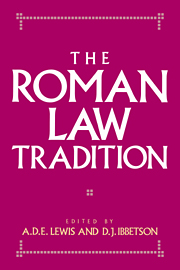Book contents
- Frontmatter
- Contents
- List of contributors
- Foreword: Peter Stein, Regius Professor of Civil Law in the University of Cambridge, 1968–1993
- List of abbreviations
- 1 The Roman law tradition
- 2 Labeo and the fraudulent slave
- 3 Doing and causing to be done
- 4 The danger of definition: contrectatio and appropriation
- 5 Going to the fair – Jacques de Révigny on possession
- 6 Bembo giureconsulto?
- 7 Gentilis and the interpretatio duplex
- 8 Ius gentium in the practice of the Court of Admiralty around 1600
- 9 Stair's title ‘Of Liberty and Servitude’
- 10 The actio communi dividundo in Roman and Scots law
- 11 Sale and transfer of title in Roman and Scots law
- 12 ‘What Marcellus says is against you’: Roman law and Common law
- 13 Audi et alteram partem: a limit to judicial activity
- Index of sources
- Index of names and subjects
8 - Ius gentium in the practice of the Court of Admiralty around 1600
Published online by Cambridge University Press: 08 October 2009
- Frontmatter
- Contents
- List of contributors
- Foreword: Peter Stein, Regius Professor of Civil Law in the University of Cambridge, 1968–1993
- List of abbreviations
- 1 The Roman law tradition
- 2 Labeo and the fraudulent slave
- 3 Doing and causing to be done
- 4 The danger of definition: contrectatio and appropriation
- 5 Going to the fair – Jacques de Révigny on possession
- 6 Bembo giureconsulto?
- 7 Gentilis and the interpretatio duplex
- 8 Ius gentium in the practice of the Court of Admiralty around 1600
- 9 Stair's title ‘Of Liberty and Servitude’
- 10 The actio communi dividundo in Roman and Scots law
- 11 Sale and transfer of title in Roman and Scots law
- 12 ‘What Marcellus says is against you’: Roman law and Common law
- 13 Audi et alteram partem: a limit to judicial activity
- Index of sources
- Index of names and subjects
Summary
Traditionally, the reputation of the early modern English Civil lawyers has to a large extent been based on their supposed expertise in international law. At an academic level, writings by Gentili, Zouch and others are presented as pre- and post-Grotian ‘classics’. Much in the same way as on the European continent, jurists trained in ius civile at law faculties were usually called upon for diplomatic missions. Their role, however, was mostly a subordinate one. In the new literary genre on ambassadors and embassies which flourished from the last two decades of the sixteenth century onwards, the ‘perfect ambassador’ was deemed to be well-versed in history, but much less in law. Apart from diplomatic service, the practice of the High Court of Admiralty, a preserve for members of Doctors' Commons, provided the Civil lawyers with the aura of a specialism in international law. Litigation at the Court of Admiralty, fostered by privateering or more peaceful foreign trade, reflected the world-wide commercial interests of late Elizabethan England and, consequently, the need to settle international disputes according to universally accepted legal standards among European nations. This need was acknowledged at the paramount level of government, as evidenced in a notorious (and often-quoted) speech by James I in 1610:
It is true, that I doe greatly esteeme the Civill Law, the profession thereof serving more for generall learning, and being most necessary for matters of Treatie with all forreine Nations. […]
- Type
- Chapter
- Information
- The Roman Law Tradition , pp. 119 - 134Publisher: Cambridge University PressPrint publication year: 1994
- 1
- Cited by



